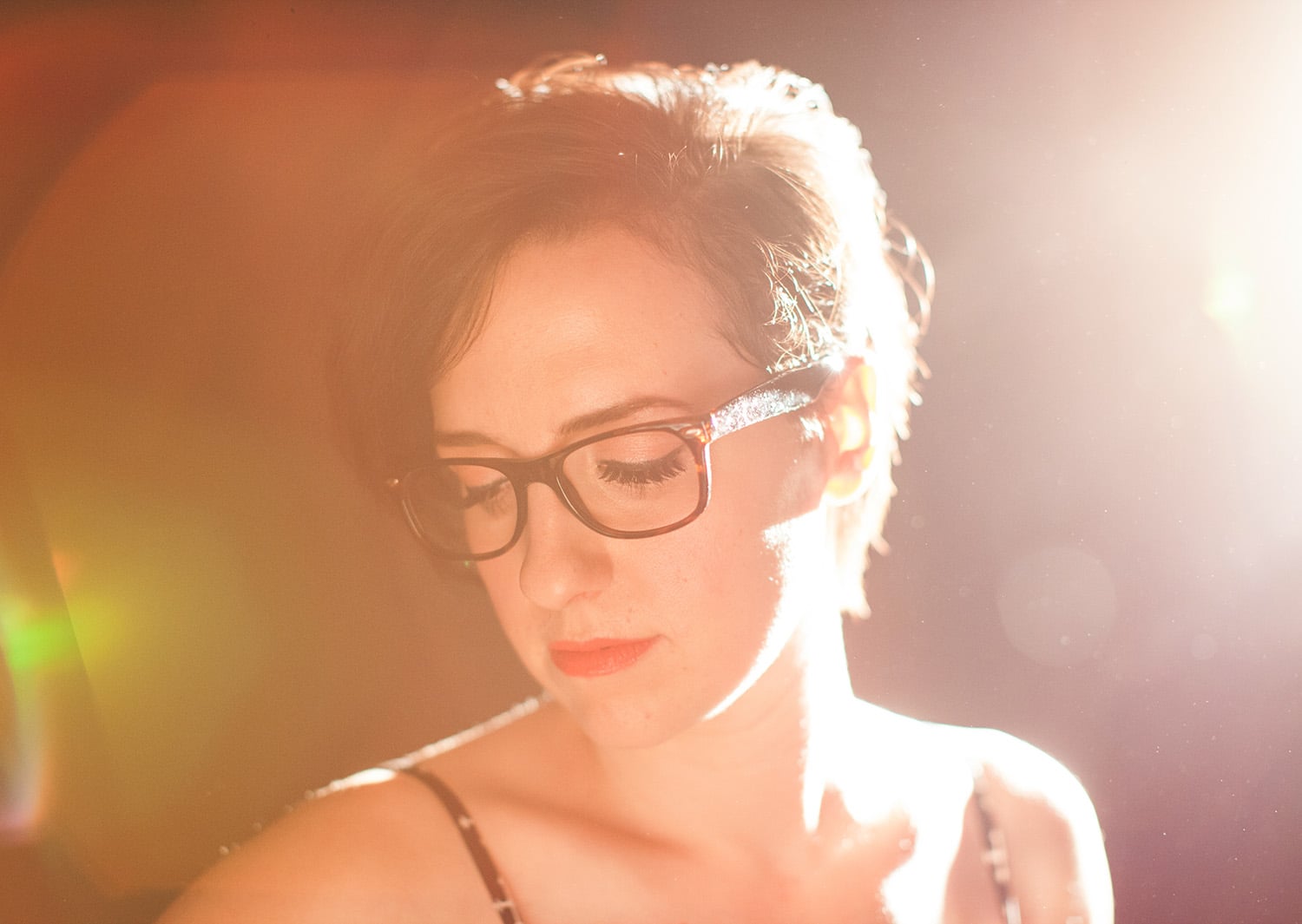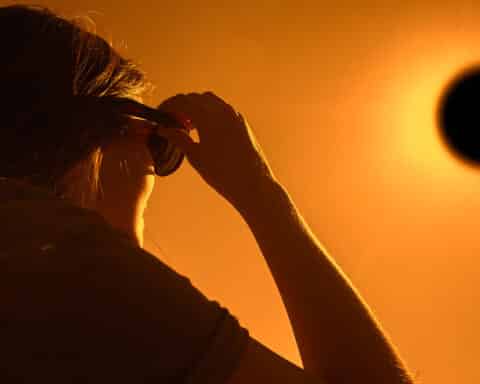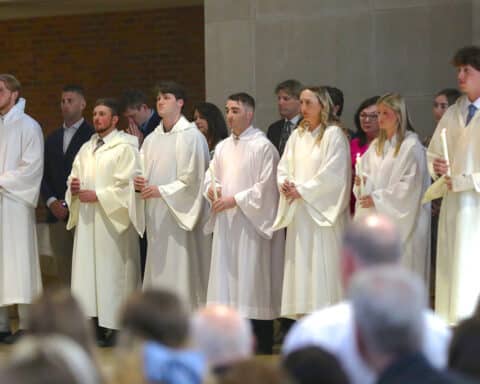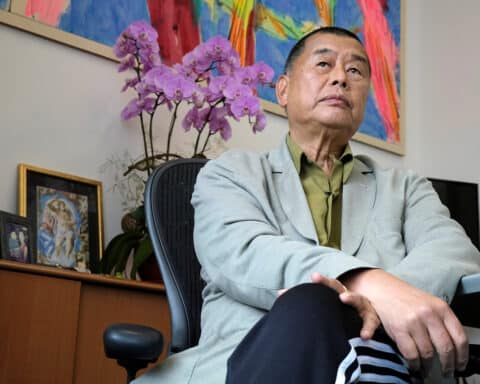When I taught high school, I used a lesson from Luigi Giussani’s work, “At the Origin of the Christian Claim,” in which he illustrates the difference between most religions and Christianity. Whereas other religions focus largely on precepts, Christianity is about an encounter with God made man: Jesus Christ.
Giussani’s illustration reminds me constantly that just as the Incarnation is a breaking-in of the infinite to the earthly, so it is in my life – in each of our lives. Faith is a gift; it comes from someone else, and it is fragile, as most precious things are. Humanity did nothing to deserve the Son’s coming from the Father, and I did nothing to deserve baptism and all the graces I have received since then. Even so, it’s not easy. This is important to remember when someone we know and love chooses to walk away from faith, or feels that they cannot believe anymore.
Audrey Assad’s journey to ‘none’
Audrey Assad, a musician whose career was largely supported and centered around Catholicism, began her journey away from the Church around 2013, she said in an interview with Mike Tenney on his podcast, “Pop Culture Catechism.” It was then that she started questioning things, specifically the Catholic teaching on the existence of hell. Following that beginning, Assad began trauma therapy in 2016 which she reported led her to more and more questions. Having converted to Catholicism at age 24 from the Plymouth Brethren, Assad became a self-described “none” around age 35.
In this journey, I am sorry to say, she is far from alone. A 2021 Pew survey found that 3 in 10 adults in the U.S. describe their religion as “nothing in particular.” The biggest drop is from formerly-professing Christians — Protestants, mostly. The buzzword in the Christian world for this is “deconstruction.”
Deconstruction as a path to firmer faith
Deconstruction is a term that, while having a more formal definition, seems to be used colloquially to encompass a wide variety of experiences and decisions. For some Christians, such as Assad, deconstruction leads to a rejection of — or at least a stepping away from — faith altogether, becoming “spiritual but not religious,” or embracing an inability to know anything for certain about a higher power that one may or may not believe exists. For others, deconstruction is a path to a deeper, firmer conviction in certain truths that the person has always held, even if other ideas are set aside.
As the word suggests, this process is a taking-apart of ideas that used to be in some sort of order, and either removing them or putting them back in a different order. Similar to the word “synodality,” I think that “deconstruction” is a fancy term for something that every Christian actually knows quite well: the process by which an adult continually integrates his or her faith and life as he or she gets older.
Contending with reality
One could liken “good” deconstruction to the story that C.S. Lewis tells about the house in “Mere Christianity.” When you begin to get serious about following Jesus, you plan to build a nice little house out of your soul — there are areas that you know need attending to, and so you sweep them up and think that you are doing well. But then Jesus starts moving walls around and doing things that you never asked for: because he is not building the little house you had planned, but rather a place for himself to live. This happens in the life of every serious Christian. You have beliefs that must contend with reality, and sometimes, something has to give, and in that process, you learn what is essential and what is not. There are plenty of things that you or I believe to be true that do not fall into the category of divinely revealed or necessary for salvation. And they might have to go sometimes.
For example, I met a man recently who believes that wearing a (medical) mask to Mass is sacrilege. He believes this so strongly that during the pandemic he refused to attend Mass at all if masks were required. This is a belief that I think ought to be deconstructed. Most Catholics (including, apparently, the pope and the bishops) disagree with this man about mask-wearing, and that fact alone should give him pause. But he got that belief from somewhere, and it is tied up with many other beliefs about God and the Eucharist, and this man will have to go through an internal battle if he starts asking himself questions about mask-wearing.
We are constantly fighting internal battles when it comes to belief — whether that belief is false or true. We hear the whisper, “What if…?” The claims of Christianity are not small claims, and it would be foolish to dismiss the deconstruction movement as if it were something utterly foreign to religious belief. On the contrary, thinking about whether something is true and asking questions about the meaning of life is what the human person does, call it what you will.
Asking questions does not an unbeliever make; deconstruction does not have to end in a pile of rubble.
The good of doubt?
Cardinal Joseph Ratzinger (later Pope Benedict XVI) begins his famous work “Introduction to Christianity” with a section entitled, “Doubt and Belief — Man’s Situation Before the Question of God.” In it, he reminds believers that they are, “always threatened with the uncertainty which in moments of temptation can suddenly and unexpectedly cast a piercing light on the fragility of the whole that usually seems so self-evident to him.” The believer’s faith is always insecure, always subject to questions and the possibility of unbelief.
Ratzinger writes of St. Therese of Lisieux, who famously struggled with doubt at the end of her life, recognizing that what was in question was not a particular teaching on X or Y, but rather, “the whole structure … all or nothing.”
Assad’s journey in the last few years demonstrates this as well. She says that after she started questioning the foundation of her beliefs, “It fell apart like a house of cards for me.” To this, Ratzinger would probably say, “Of course it did.” But he offers us — believers and unbelievers alike — a word that binds us together, and that is “perhaps.”
Perhaps it is true. And this is where we meet, all human beings, for there is no absolute certainty in this world. We know that we will die, but after that? Both the Catholic and the “none” share doubt and belief. As Ratzinger notes, “Neither can quite escape either doubt or belief; for the one, faith is present against doubt; for the other through doubt and in the form of doubt.”
‘But what if it’s true?’
Just as I will always grapple with the question, “What if none of this is true?” Assad will now ask herself, “But what if it is?” This is something she acknowledges to Tenney at one point, noting that she wishes she could believe that at the end of time, love will win. Ratzinger suggests that this doubt is precisely what makes us able to communicate with one another. “[Doubt] prevents both from enjoying complete self-satisfaction; it opens up the believer to the doubter and the doubter to the believer.”
Audrey Assad felt that she needed to leave the Church in order to become a more open person, a humbler person, a person without all the answers. It is too bad she did not know that she could be all those things without leaving and that no one has this whole believing thing easy. The apostle Thomas said he wouldn’t believe unless he put his fingers into Jesus’ hands and his hand into Christ’s side. We doubters — which is all of us, at some level — are in good company.





